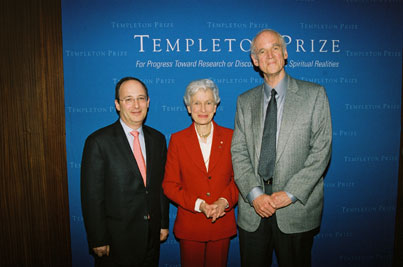Charles Taylor awarded Templeton
Charles Taylor awarded Templeton McGill University
User Tools (skip):
Charles Taylor awarded Templeton

TOAST OF THE TOWN (l to r): McGill Vice-Principal, Inter-institutional Relations, Michael Goldbloom, former McGill chancellor Gretta Chambers and her brother, McGill Professor Emeritus of Philosophy Charles Taylor, at the Wednesday, March 14, announcement in New York of Prof. Taylor's 2007 Templeton Prize.
Karen Marshall
McGill philosophy professor emeritus Charles Taylor has been recognized as one of the most profound thinkers of our time on spirituality and secularism, as the first Canadian to receive the Templeton Prize, which outweighs the Nobel as the world’s largest annual monetary award for an individual.
“I want to say how deeply honoured I am to be chosen for the Templeton Prize,” Taylor said at the announcement. “I believe that the goal Sir John Templeton has chosen is of the greatest contemporary importance and relevance: we have somehow to break down the barriers between our contemporary culture of science and disciplined academic study on one hand, and the domain of spirit, on the other. This has been one of the driving goals of my own intellectual work, and to have it recognized as such fills me with an unstable mixture of joy and humility.”
The ceremony in New York was attended by Prof. Taylor’s sister, former McGill Chancellor Gretta Chambers, and McGill Vice-Principal, Inter-institutional Relations, Michael Goldbloom, who thanked Prof. Taylor for his “unique contributions in advancing our understanding of Western modernity, in sharing his insights with students, colleagues and society and most importantly, for his profound and inspiring humanity.”
The 2007 Templeton Prize for Progress Toward Research or Discoveries About Spiritual Realities was announced at the Church Center for the United Nations in New York March 14 by the John Templeton Foundation.
The Duke of Edinburgh will officially present the prize during a private ceremony at Buckingham Palace on May 2.
The award is worth 800,000 pounds sterling (approximately $1.5 million USD). Created by British investor and philanthropist Sir John Templeton, the annual award value is purposely set to exceed the Nobel Prizes to underscore the founder’s belief that spiritual exploration and discovery are of equal or greater value than those of other human endeavours.
In previous years the award has been bestowed upon such humanitarian and intellectual giants as Mother Teresa and Aleksandr Solzhenitsyn.
Philip Buckley, Chair of McGill’s Department of Philosophy, said the award rightly recognizes not only the exceptional quality of Prof. Taylor’s philosophical research but its relevance to urgent real-world problems. “The subjects most central to Prof. Taylor’s work are questions of identity, both individual and collective. What we’re seeing in contemporary society, with conflicts that involve complicated group allegiances, is that these issues are really important and not just academic,” Prof. Buckley said.
“It’s also nice to know that a philosopher can be paid as much as a baseball player,” Prof. Buckley joked.
Storrs McCall, who came to know Prof. Taylor when the two were undergraduates at McGill in the early 1950s and has been his colleague in the philosophy department for over 20 years, said he was delighted that his friend had been inducted into the pantheon of Templeton Prize winners.
“Chuck is an excellent scholar. The Sources of the Self is a major, major work,” he said, referring to Taylor’s highly influential 1989 book, a philosophically informed reflection on history and the individual.
“In addition to being a scholar, he’s also been a very active participant in politics, in a broad sense,” said McCall, who remembers canvassing for Prof. Taylor when he ran federally as a New Democratic Party candidate in the 1960s against, among others, Pierre Trudeau.
Prof. Taylor is still very much engaged in politics.
Last month, after a series of incidents in which Quebec’s traditional religious and cultural norms clashed with those of newly arrived Quebecers, Quebec Premier Jean Charest appointed him to co-chair a commission that will explore and help frame the debate surrounding the reasonable accommodation of religious and cultural minorities in the province.

